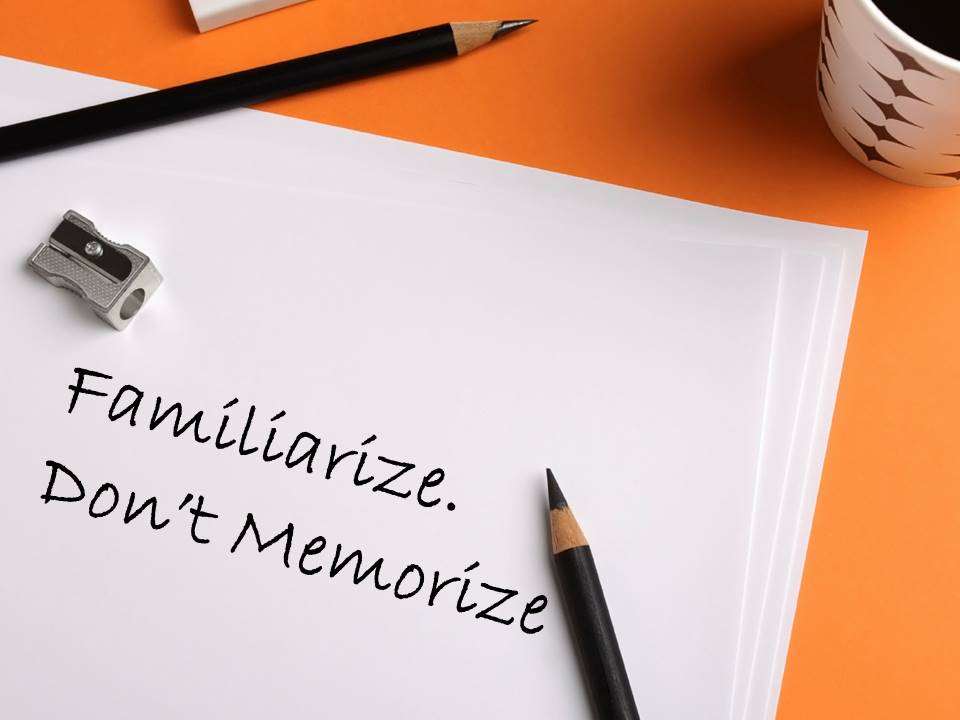It was the summer of 2009 and I had eight, 45-minute presentations to memorize as a newly hired high school workshop speaker for a local college. The other new speakers and I had been given scripts for each of the presentations, with topics ranging from budgeting to sexual harassment, and had been told to follow the scripts closely to make sure that the promised objectives were covered. We had six weeks to learn the scripts, and would be presenting four of the eight topics in front of the program administrators and a few of the other new speakers.
For the first presentation, I spent hours breaking it down and practicing in small chunks. I practiced in my bedroom. I practiced in my car. I even practiced on the driveway, outlining the presentation in chalk, complete with colorful pictures. It was an agonizingly slow process. And I had to do it seven more times before the end of summer.
I had two main problems. One, the material wasn’t my own and some of the phrasing wasn’t my style. Two, it was really, really hard to memorize something word for word, no matter who wrote it! But, I tried, and largely succeeded, or so I thought.
On the day of the presentation, I was the first speaker. I went through the script almost flawlessly. It was . . . too perfect. Actually, it wasn’t perfect at all. My pace was a little slow, as I was trying to recall the exact wording at times. My words weren’t my own, so I sounded a little “stilted.” And, my eye contact was more of a glazed-over look as I was actually looking at the words on the imaginary page in front of me. I had studied the scripts so carefully, that I knew where on the page I was when I was presenting the material.
When I finished, I looked over at the administrators. They smiled politely, clearly wondering what happened to the expressive woman who had wowed them with a lively audition just a week before. And then one said, “You don’t have to memorize it and you can even tell your own stories, as long as they are relevant.”
What a relief! I just got my summer back. It would still take time to prepare for seven more presentations, but if I could speak extemporaneously, practicing from an outline instead of a script, and include my own material, then not only would it be easier, but I would sound more conversational.
As I was basking in relief, the next speaker started. He had not memorized the material. I’m not sure if he had even had tried to learn it. He actually read the script, occasionally looking up, which sometimes caused him to lose his place. This approach, the reading approach, was not going to work at all in front of a teen audience (not in front of any audience, really).
The third speaker didn’t memorize as I had done and he didn’t read the script, either. He gave an impromptu version, loosely following the outline, but missing some of the key points. He was clearly not familiar with the material, although he was easy to listen to.
The fourth speaker hit it out of the ball park. He had discovered the key: Familiarize. Don’t memorize.
Familiarize. Don’t memorize.
If I could familiarize myself with the material, and know it well, but not memorize it, I knew would connect with the teens. I could speak from the heart and really look into their eyes, not at my imaginary script. Of course, certain phrases were still expressed the same way every time and once in a while parts were impromptu, unplanned comments inspired by the moment.
To get away from sounding scripted, I learned I needed to practice from keywords, or an outline. I had to resist the writer’s temptation to say it exactly as I wrote it. If I did, I sounded “stilted.”
I sounded stilted because I didn’t write the way I spoke. When we speak, we used shorter sentences and shorter words. We use contractions. We use an active voice (e.g., Chelsie wore an itsy bitsy, polka dot bikini) vs. a passive voice (“The itsy bitsy, polka dot bikini was worn by Chelsie).
To speak with passion, don’t memorize, don’t read and don’t speak completely off-the-cuff, instead . . .
Familiarize. Don’t Memorize.

